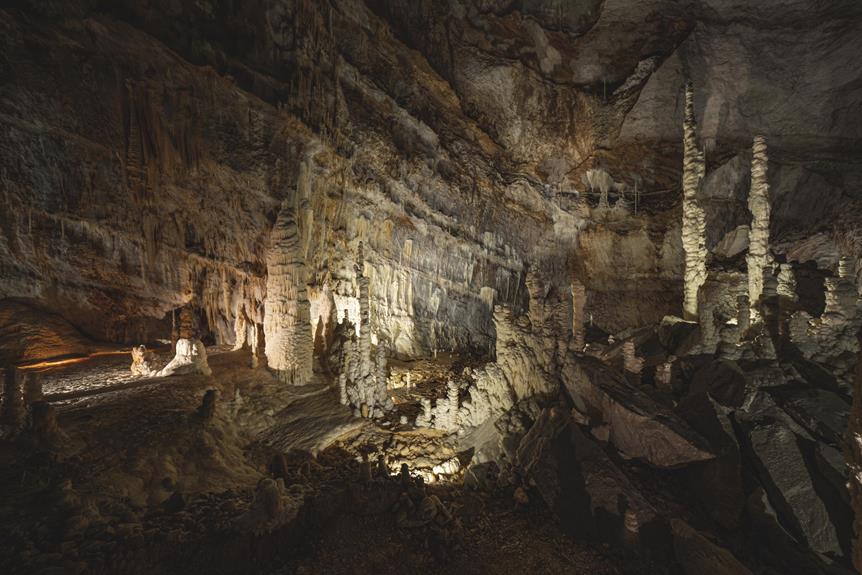Exploring the historical cliff formations in Algarve is like stepping into a time machine. As I venture along the rugged cliffs, shaped by the relentless forces of wind and sea, I am transported back to an era long gone. These geological wonders hold the secrets of the region's past, revealing the story of millions of years.
Every cliff formation, from the famous Benagil Cave to the picturesque Ponta da Piedade, has its own enchanting allure. Walking along the cliff paths, I discover hidden beaches and caves, a true delight for nature enthusiasts and adventure seekers alike.
The breathtaking views of golden cliffs and turquoise waters offer a glimpse into the mesmerizing beauty of the Algarve.
Key Takeaways
- Cliff formations in Algarve are shaped by erosion and the forces of wind and sea, showcasing ongoing geological processes.
- These formations have played a historical role in defending the coastline, acting as natural landmarks, and providing hiding places for pirates and smugglers.
- Algarve's cliff formations hold cultural significance as an integral part of the region's identity, inviting adventure seekers and nature enthusiasts to explore their beauty.
- Iconic cliff formations like the Benagil Cave, Ponta da Piedade, Praia da Marinha, and Algar Seco offer stunning views, unique geological features, and a gateway to understanding the historical significance of Algarve.
Formation of Algarve's Cliff Landscape
In my exploration of the historical cliff formations in Algarve, I was amazed by the enduring impact of natural forces on the landscape, shaped over millions of years through erosion and the action of wind and sea.
The cliffs of Algarve, such as Ponta da Piedade and the Algar Seco cliff, are a testament to the ongoing geological processes at work in shaping this region. The rock formations, including the impressive Forte da Ponta da and the breathtaking Praia da Marinha, provide a stunning backdrop for those who choose to walk along the cliffs.
As you venture along, you'll discover the beautiful beaches of Algarve, like Praia da Dona Ana, and the famous Benagil Cave. These natural wonders showcase the power of natural forces in creating the unique and awe-inspiring cliff landscape of Algarve.
Geological Significance of Algarve's Cliff Formations
Exploring the historical cliff formations in Algarve, I was captivated by the geological significance of these unique natural wonders shaped by millions of years of erosion and the relentless forces of wind and sea. The Algarve region boasts stunning limestone cliffs that hold valuable insights into the Earth's ancient history. Praia de Boião, for instance, showcases limestone rocks believed to have formed 25 million years ago. These cliffs offer a glimpse into the geological processes that have crafted the Algarve's captivating coastline. On the western side, the red and ocher cliffs of Praia da Falésia rise up to 40 meters, making them some of the most impressive in Portugal and the world. Additionally, the limestone coastline is dotted with rock arches and hidden caves, like those found at Algar Seco in Carvoeiro, providing a fascinating display of the region's geological diversity. The geological significance of these cliff formations cannot be overstated, as they not only contribute to the breathtaking beauty of the Algarve, but also hold valuable scientific and historical information about the Earth's past.
| Cliff Formation | Geological Significance |
|---|---|
| Praia de Boião | Offers a glimpse into the ancient geological history of the region |
| Praia da Falésia | Showcases the diverse geological landscape of the Algarve |
| Algar Seco | Provides a fascinating display of unique geological features shaped by erosion |
Historical Role of Cliff Formations in Algarve
I was fascinated to discover the historical significance of Algarve's cliff formations. These majestic formations have played a vital role in shaping the region's history and have witnessed countless events unfold over the centuries.
Here are four key historical roles of the cliff formations in Algarve:
- Defending the coastline: The top of the cliffs provided a strategic advantage for defensive purposes, with forts and castles built to protect against invasions.
- Natural hiding places: The caves and crevices within the cliff formations served as hiding places for pirates and smugglers, who utilized the rugged terrain to evade capture.
- Navigation landmarks: The unique formations acted as natural landmarks for sailors, guiding them along the coastline and helping them navigate through treacherous waters.
- Inspiring art and literature: The natural beauty of the cliff formations has inspired artists and writers throughout history, capturing their imagination and influencing their works.
The historical role of Algarve's cliff formations isn't just limited to their geological significance, but also encompasses their contribution to the region's culture and art. Exploring these formations provides a fascinating glimpse into the past and a deeper appreciation for the rich history of Algarve.
Cultural Significance of Algarve's Cliff Formations
Having explored the historical role of Algarve's cliff formations, I can now delve into the cultural significance they hold for the region.
These majestic cliffs, with their unique rock formations and hidden grottos, aren't only a sight to behold but also an integral part of Algarve's identity.
The cliffs of Algarve offer a playground for adventure seekers and nature enthusiasts alike, providing opportunities for exploring and discovering hidden treasures along the coastline.
The caves carved into the rock formations invite visitors to embark on unforgettable boat trips, where they can marvel at the crystalline waters and admire the intricate beauty of the cliffs up close.
The cultural significance of these cliff formations lies in the way they captivate the imagination, inspire awe, and showcase the natural beauty that Algarve has to offer.
Iconic Cliff Formations in Algarve's History
The region's history is intertwined with the iconic cliff formations of Algarve, showcasing their enduring presence and significance. These impressive rock formations have witnessed the passage of time and hold stories from centuries ago.
Exploring the historical cliff formations in Algarve allows us to delve into the rich tapestry of the region's past. Here are four iconic cliff formations that have played a role in shaping Algarve's history:
- Benagil Cave: This magnificent cave, resembling a big domed temple, is accessible from Praia de Benagil. It has been a natural marvel for centuries, attracting visitors with its unique skylight and awe-inspiring beauty.
- Ponta da Piedade: Offering stunning caves and rock formations, Ponta da Piedade can be best admired from the cliffs or on a boat trip. Its historical significance is reflected in the breathtaking views it provides, making it a must-visit spot for history enthusiasts.
- Seven Hanging Valleys: Praia da Marinha, with its rock formations and clifftop views, is home to the Instagram-worthy heart-shaped rock. The trail called Sete Vales Suspensos allows visitors to explore more formations and enjoy panoramic views of the coastline.
- Algar Seco: Known for its lunar landscape, Algar Seco features rock pools, caves, and balconies carved by wind and sea. Its sweeping views and the boardwalk leading to the center of Carvoeiro offer a glimpse into Algarve's rich coastal history.
Exploring these iconic cliff formations in Algarve not only allows us to appreciate their natural beauty, but also serves as a gateway to understanding the historical significance of this remarkable region.
Frequently Asked Questions
Where Are the Rock Formations in Algarve?
There are hidden caves, geological wonders, and unique rock formations in Algarve. Coastal erosion has created stunning viewpoints and natural arches. Cliffside hiking trails offer a chance to explore the limestone formations and discover marine fossils, revealing the area's geological history.
What Is the Most Scenic Place in the Algarve?
The most scenic place in the Algarve is Praia da Marinha. With its stunning sunset views, hidden beaches, and unique rock formations, it offers a perfect blend of natural beauty and tranquility.
What Is the Most Beautiful Cave in the Algarve?
The most beautiful cave in the Algarve is the Benagil Cave. Its stunning domed structure and open skylight make it a hidden gem worth exploring. Its geological wonders and coastal beauty are unparalleled.
Why Are the Cliffs Red in the Algarve?
The cliffs in the Algarve are red due to the presence of iron oxide in the sandstone and limestone. Over time, weathering and coastal erosion have shaped these sedimentary rocks, creating a unique landscape of vibrant red cliffs that showcase the area's natural beauty.
Conclusion
In conclusion, the historical cliff formations in Algarve are a mesmerizing sight that transports you through time. These rugged cliffs, shaped by the forces of wind and sea, hold the secrets of the region's geological past.
As you walk along the cliff paths, you can't help but be captivated by the hidden beaches, caves, and breathtaking views of the golden cliffs and turquoise waters.
Exploring these cliff formations is a truly awe-inspiring experience that showcases the natural beauty and rich history of the Algarve.



